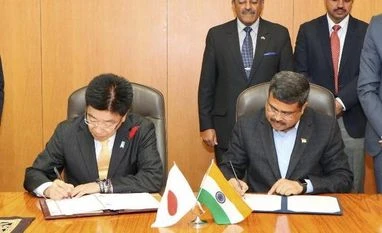Japanese trade minister Hiroshige Seko and India's oil minister Dharmendra Pradhan on Wednesday signed a memorandum of cooperation in Tokyo on working to establish a liquid, flexible and global market for liquefied natural gas (LNG).
This comes after India said last week it would work with Japan to make long-term LNG import deals more affordable for its price-sensitive consumers as they try to secure better prices and concessions from suppliers.
The world's biggest LNG buyers, all in Asia, are increasingly clubbing together to secure more flexible supply contracts in a move that shifts power to importers from producers in an oversupplied market.
The accord was signed at the annual LNG Producer-Consumer Conference in Tokyo on Wednesday.
The two nations agreed to work to cooperate in areas including the following:
1. Boosting efforts for more flexible LNG contracts, noting that so-called destination restrictions should be abolished.
More From This Section
2. Exploring possibilities for establishing reliable LNG spot price indices reflecting true LNG demand and supply.
3. Exchanging information and exploring possible cooperation on joint measures against unexpected market disruption.
4. Exchanging information on their policies related to areas such as LNG procurement, supply diversification, market deregulation and promotion of open gas infrastructure including LNG re-gasification terminals, underground gas storage and pipelines.
5. Enhancing cooperation to encourage other importing and exporting countries to join efforts to establish a well-functioning LNG market.
6. Cooperating on "shipping optimisation" by encouraging cargo swaps.
)